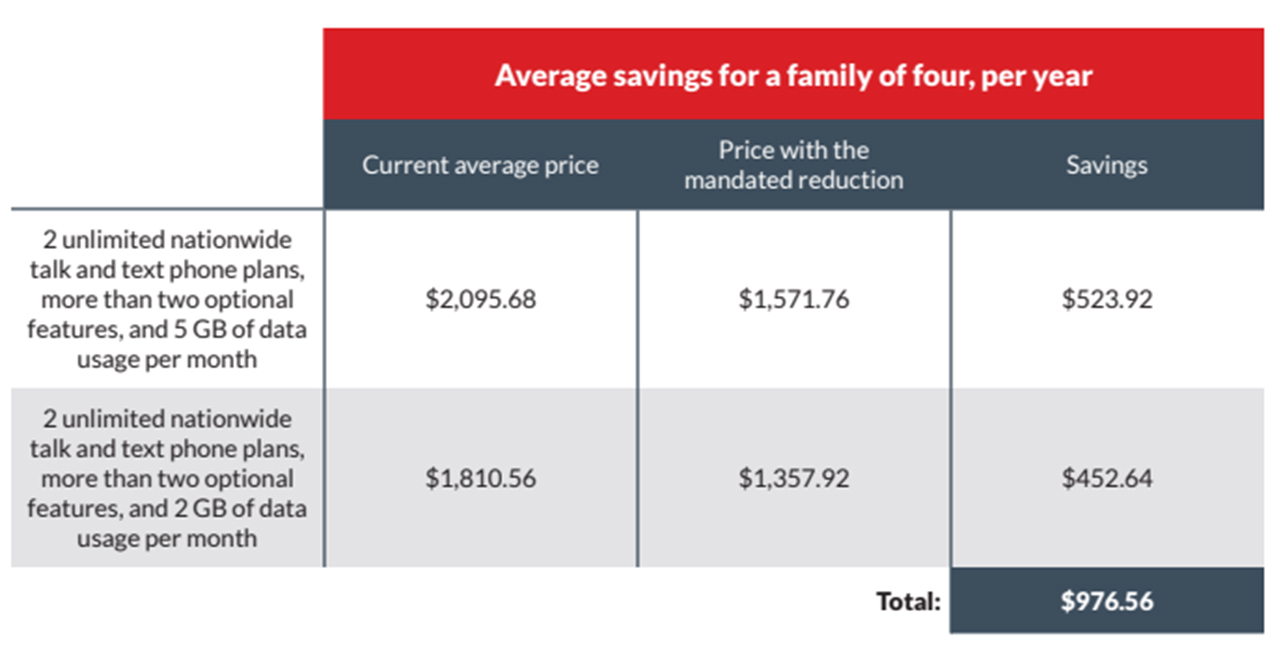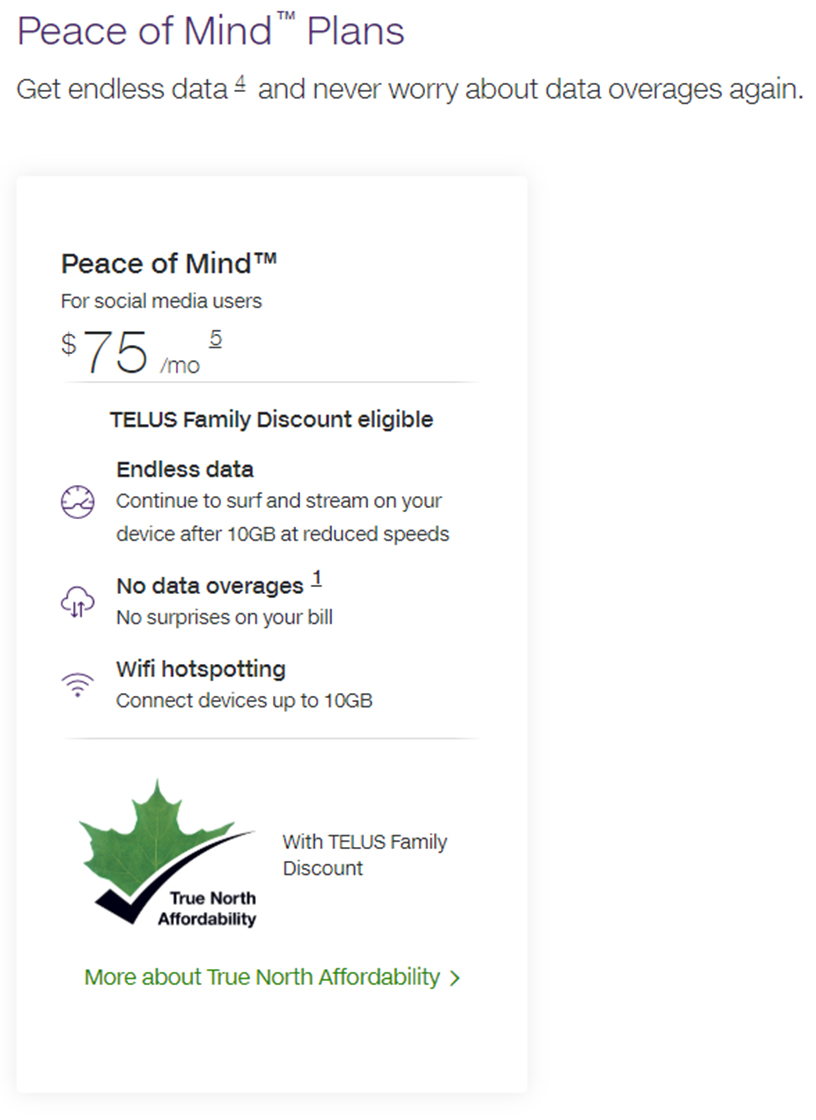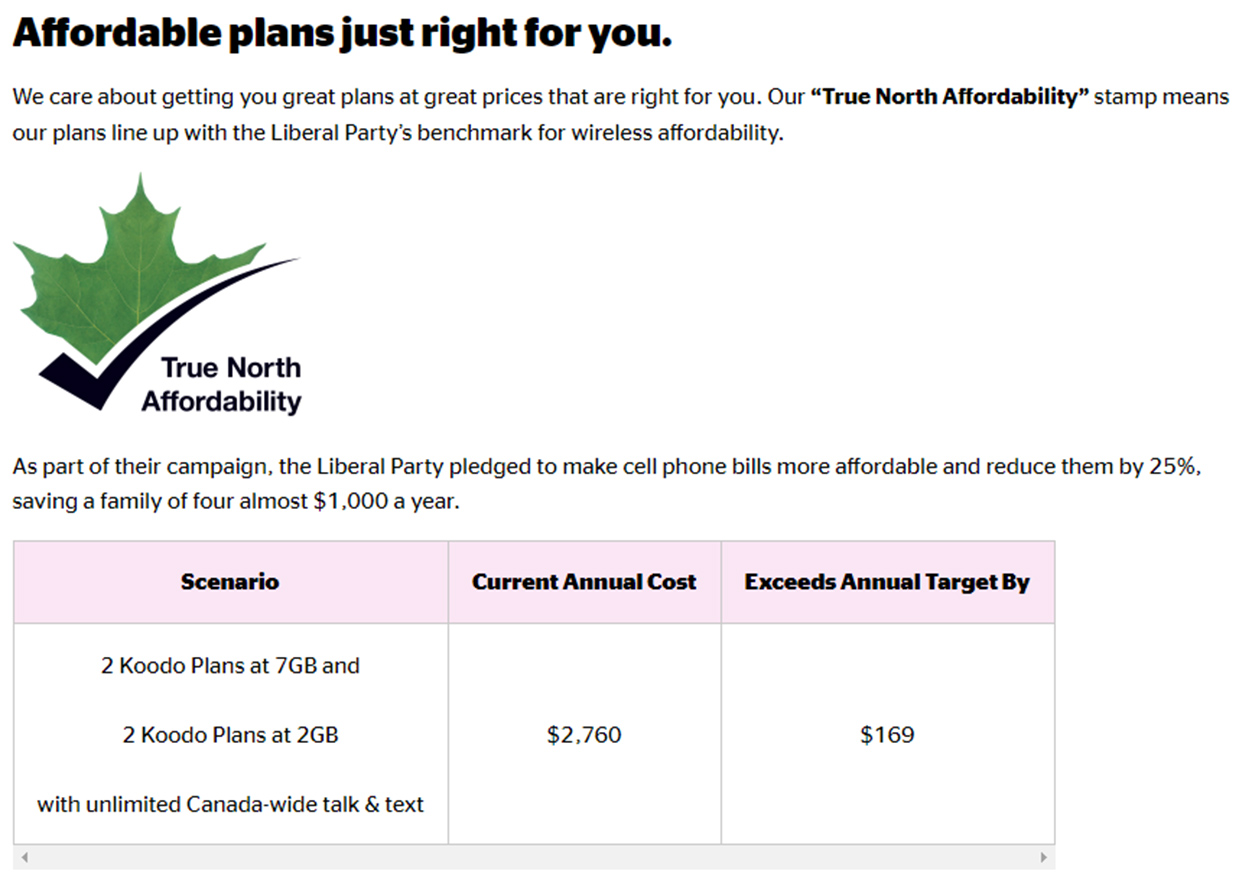
If you’ve spent much time on Telus’ website — or on the websites of its flanker brands Koodo and Public Mobile — in the last week, you may have noticed an interesting new label on some of the carriers’ plans.
The new label, which Telus dubs the ‘True North Affordability stamp,’ means that some of the carrier’s plans “line up with the Liberal Party benchmark for wireless affordability,” according to Telus’ website. However, at the time of writing, the government had not made any official move to improve wireless affordability in Canada. Instead, Telus refers to a document the Liberal Party shared as part of its campaign last year.
MobileSyrup reached out to Telus about the label, but the carrier did not provide comment about it.
That document, available here, details the Liberal Party’s proposed plan to reduce cell phone bills by 25 percent by working with telecom companies and encouraging competition through the introduction of mobile virtual network operators (MVNO) into the Canadian wireless market.

Further, the document notes that the current average price a Canadian family of four pays for a year of wireless service is about $3,906, or about $81 per family member per month. The document assumes that two lines include unlimited nationwide talk and text with more than two optional features and 5GB of data usage per month, and two of the same plan but with 2GB of data usage per month. In other words, two more expensive ‘adult’ plans and two less expensive ‘kid’ plans with a total of 14GB of data per month.
The document also outlines the cost after a 25 percent reduction, which with the same plans would work out to roughly $2,929 per year or about $61 per family member per month. That works out to a savings of roughly $976.56 per year.
Telus claims it offers plans that are better than the Liberal’s proposal

However, Telus uses the True North Affordability stamp to highlight that some of its plans already exceed the Liberal Party’s campaign plan. On its website, Telus claims that its $75 Telus Peace of Mind plan with 10GB of high-speed data followed by unlimited use at a throttled maximum speed of 512Kbps exceeds the $2,929 per year benchmark.
The claim factors in Telus’ Family Discount program. The program reduces the bill by $5 per month per line for accounts with two lines, $10 per month per line for three lines and $15 per month per line for four to nine lines. So, in the family of four example, the $75 plan means each person would pay $60 per month after the Family Discount, or $240 total for the family each month. A year of service would then cost $2,880, which, as Telus notes, beats the annual target by $49.
Further, Telus points out on its website that the plan includes 26GB more data than the Liberal’s sample plans.

Likewise, the Koodo website points out that two Koodo plans with 7GB of data and two Koodo plans with 2GB of data, both with unlimited Canada-wide talk and text, would cost a total of $2,760 per year and beat the Liberal example by $169. Plus, the Koodo plans would include an extra 4GB of data over the sample plans.
Finally, Telus points out that “Canada’s unlimited plans are ranked #1 based on wireless speed, access, latency and cost per GB among G7 nations” and links to this PWC study as a basis for the claim. The Liberal Party document says that a re-elected Liberal government would implement a plan to reduce wireless prices to “bring Canada in line with prices across the G7 and Australia.”
What does this mean for me?
At the moment, it doesn’t mean much. Telus and its flanker brands haven’t actually introduced any new plans or reduced their plan prices at all. Instead, the True North Affordability stamp is about communicating that the Liberal’s campaign promise has already been met.
A Scotiabank Equity Research Alert obtained by MobileSyrup notes that “[t]his demonstrates that existing facilities-based competition is already driving down pricing, and we believe no further price regulation is required in the industry.”
The Scotiabank alert also states that it thinks “the pricing trend since mid-2019 gives room for the government to allow the CRTC’s independent process to play out and for the CRTC to deliver its [wireless review on MVNOs] decision based on evidence on record as opposed to political influence or unsupported rhetoric.”
Indeed, the CRTC is set to begin public hearings as part of the MVNO wireless review on February 18th in Ottawa. The hearings will focus on whether MVNOs should have mandated access to the Big Three’s networks and will likely touch on wireless affordability and regulation for 5G deployment.
It’s also worth noting that Telus’ affordability stamp doesn’t include if customers want to get a phone with their plan, which can dramatically increase the monthly cost. The introduction of device financing programs from Telus, Rogers and Bell last year means that the device cost is now separate from wireless service plans. As a result, plans are now significantly cheaper unless you include the monthly financing cost.
Since financing costs are still loosely connected to plans — if you want to finance a device with Telus, you need an eligible Telus plan — adding any device financing to a wireless service plan invalidates it as far as affordability is concerned. However, the Liberal document also neglects to address the matter of device financing and speaks only to the cost of wireless service.
What remains to be seen is the long-term impact of Telus’ affordability claim. The most immediate impact will likely come with next week’s CRTC hearings where Telus and other carriers will probably argue the affordability of their wireless plans. It’s also unclear how the government will react to carriers claiming to already meet affordability benchmarks.
At the time of writing, Bell and Rogers did not display similar affordability labels on their websites.
MobileSyrup may earn a commission from purchases made via our links, which helps fund the journalism we provide free on our website. These links do not influence our editorial content. Support us here.


